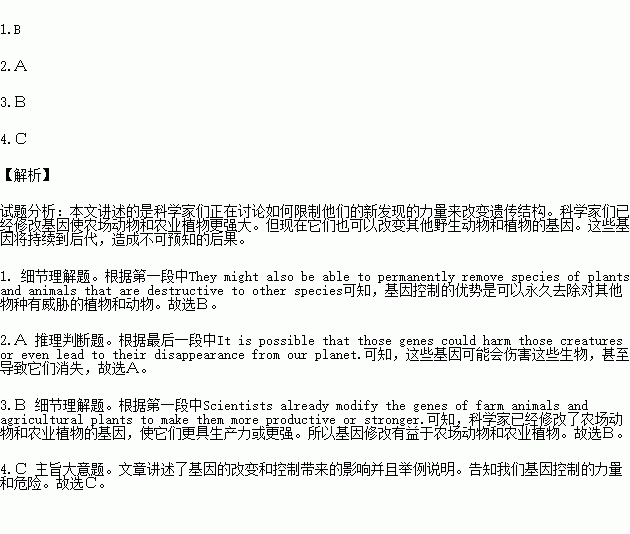题目内容
Scientists are debating how to limit their newly-discovered power to change genetic structure (结构). Scientists already modify the genes (基因) of farm animals and agricultural plants to make them more productive or stronger. But now they can also change genes in wild animals and plants. These genes would continue into later generations. For example, it may be possible for scientists to remove from existence the kind of mosquitoes, small flying insects, that carry the Zika virus. They might also be able to permanently remove species (物种) of plants and animals that are damaging to other species.
In a report published last week, the U. S. National Academies of Sciences, Engineering and Medicine (NAS) said it supports continued research on this kind of gene control. But it warned that it is not possible to know what will happen when these changed plants and animals are released (释放) into the wild.
Sixteen biologists, ethicists (伦理学家) and policymakers are on an NAS committee that is examining the issue. They say that there is value to the new technology. But, they say, there is not enough evidence to support the release of modified organisms (生物体) from the laboratory into nature.
Many people would support stopping mosquitoes and rats from carrying diseases. But scientists say we must understand the possible scientific, ethical, legal and social results of such action before we decide whether to take it. Gene modification is spread through reproduction (繁殖).
Changed genes will continue to spread as long as an animal or plant continues to reproduce. They cannot be limited to a farm or kept within a country's borders. Scientists are wondering what may happen if a modified organism mates with another species. They are not yet sure how the modified genes would affect the other species. It is possible that those genes could harm those creatures or even lead to their disappearance from our planet.
【小题1】What possible advantage does gene control in wild animals and plants have?
A. Changing the Zika virus permanently.
B. Getting rid of damaging species forever.
C. Having the changed genes in their next generations.
D. Making all the species more productive and stronger.
【小题2】As for genetically changed wild animals and plants, what are scientists worried about?
A. They may become weaker or die out.
B. They may be more productive than before.
C. They may cause damage to their living habitat.
D. Their genes may spread to later generations.
【小题3】Which of the following is true according to the passage?
A. Scientists are certain what exact results gene modification leads to.
B. Gene modification can benefit some farm animals and agricultural plants.
C. Scientists won't modify any genes before they make the final decision.
D. Gene modification will be encouraged in more creatures in the near future.
【小题4】The article is mainly intended to ________.
A. appeal against research on gene control
B. show how to change genetic structure
C. inform us of power and danger of gene control
D. give the reason why gene modification is necessary
 星级口算天天练系列答案
星级口算天天练系列答案 芒果教辅达标测试卷系列答案
芒果教辅达标测试卷系列答案HIGHFIELD COMPREHENSIVE SCHOOL SCHOOL REPORT Form Teacher: G. Baker Pupil’s Name: Simon Watkins Term: Summer 2016 Form: B | |||
Subject | Exam | Class work | Comments |
English | 59 | 61 | Simon has reached a satisfactory standard but now needs to apply himself with more determination. |
Mathematics | 77 | 85 | Sound work and progress throughout the year. Well done! |
History | 46 | 53 | A disappointing exam result. He is unable to give attention to this subject for long. |
Chemistry | 78 | 85 | His obvious ability in the subject was not fully reflected in his exam work, but I have high hopes for him nevertheless. |
Physics | 86 | 94 | An excellent term’s performance. He goes from strength to strength. A born scientist, I feel. |
Biology | 57 | 60 | This time next year he will be taking the "O" Level exam. He needs to concentrate on(全神贯注于) the work, not on class conversation. |
French | 41 | 46 | Clearly he didn’t revise. His general attitude is far too casual. |
Physical Education | / | 31 | Weak. It’s time he exercised his body more and his voice less. He should try to work with a team. |
FORM TEACHER’S REMARKS Basically satisfactory work and progress though he will now have realized, I hope, that in certain subject areas he needs to make speedy improvement. HEADMASTER I shall pay attention to his progress in his weaker subjects though his success in the sciences is most pleasing. | |||
1.According to the comments of the Physical Education teacher, Simon _____.
A. is too talkative in the class
B. likes to work with his classmates
C. doesn’t exercise his body at the right time
D. becomes weak because he doesn’t exercise at all
2. Which of Simon’s subjects will attract the headmaster’s attention in future?
A. Biology and Maths. B. History and French
C. English and Chemistry. D. Physics and Physical Education.
3. Which of the following statements best describes Simon?
A. He has made great progress in language classes.
B. His potential has been fully reflected in science classes.
C. His grade in maths makes him a born scientist.
D. He needs to improve his attitude on certain subjects.
4. Based on the school report, which of the following statements is true?
A. Simon didn’t bother his teacher to revise French.
B. Simon is a determined learner in English.
C. Basically, Simon did a good job in science.
D. Simon is able to pay attention to history for long.

